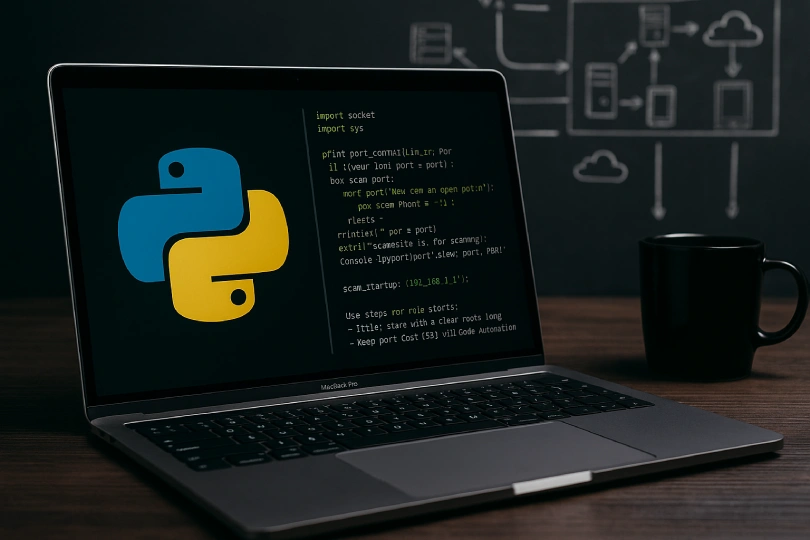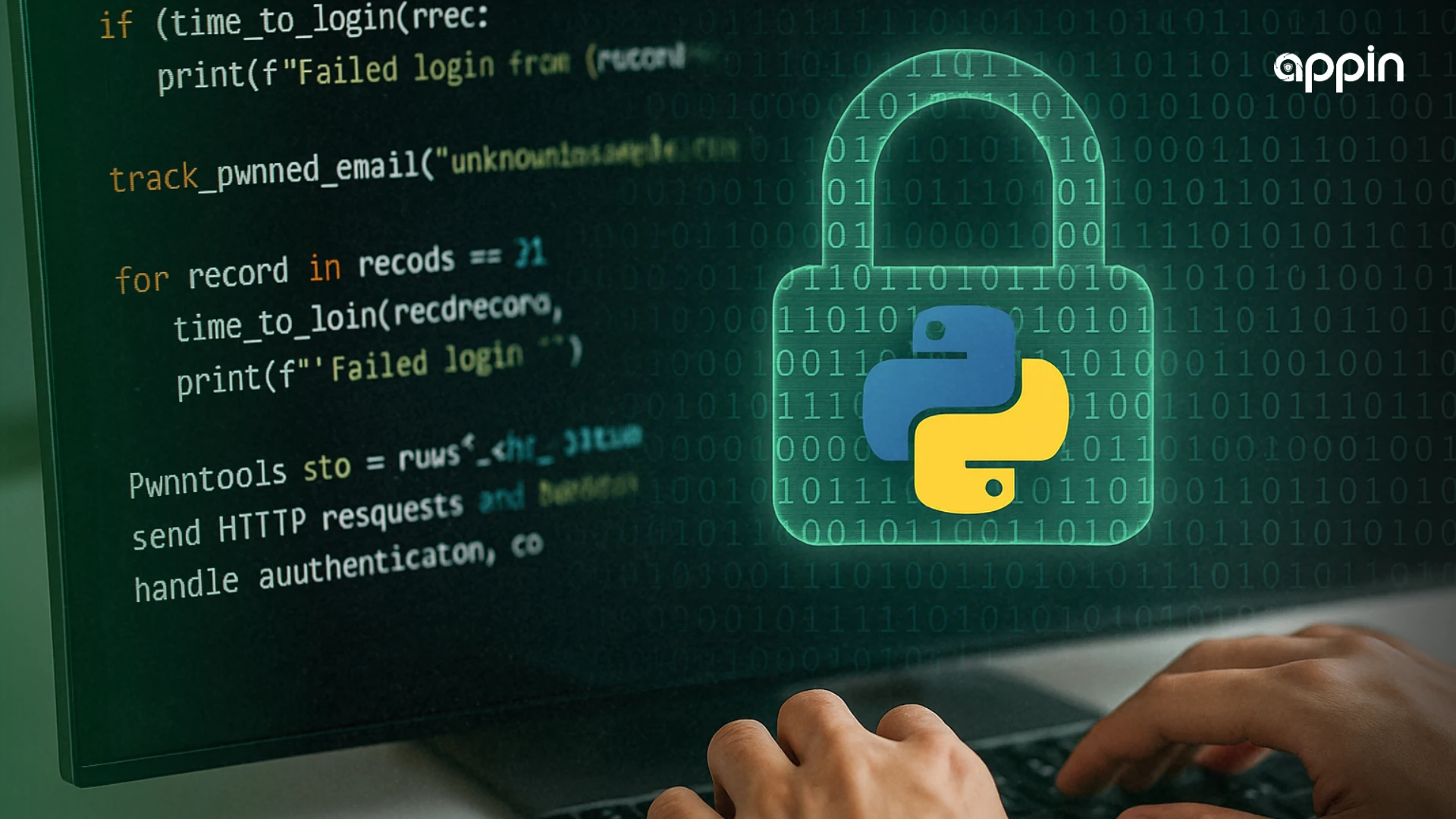Learn Python first to unlock powerful automation and analysis in cybersecurity. As security teams race to outpace attackers, Python scripts can simplify tasks that once took hours.
By mastering Python early, you can:
- Automate repetitive scans and log parsing
- Build custom tools for vulnerability testing
- Prototype exploits and proof-of-concepts quickly
- Integrate with security platforms and APIs
Python’s clear syntax makes it ideal for beginners, yet its depth supports advanced projects. Pairing your coding skills with a cyber security certification ensures you not only write effective scripts but also understand best practices and industry standards.
In this post, you’ll discover seven key reasons to start with Python before any other language. You’ll see how it accelerates learning, enhances your toolkit, and positions you for success in a cybersecurity career. Whether you’re new to programming or switching fields, these insights will guide your next steps.
Why Python Leads in Cybersecurity
Python’s clear syntax and extensive libraries make it the go-to choice when you learn Python first for a cybersecurity career. Its readability means you spend less time wrestling with code and more time solving security challenges.
Key advantages of Python in security:
- Rapid Scripting so you can write scanners, parsers, and automation scripts in minutes
- Flexible Integration with tools and APIs, from network scanners to web frameworks
- Rich Libraries like Scapy for packet crafting and Requests for HTTP interactions
- Active Community that maintains tutorials, modules, and exploit proof-of-concepts
Because Python combines simplicity with power, beginners and experts alike rely on it for tasks ranging from log analysis to exploit development. In security labs, rapid scripting allows you to adapt code on the fly when testing targets. Flexible integration means you can plug Python scripts into larger workflows or use them to extend existing tools.
Whether you build a small utility to filter logs or a full-fledged vulnerability scanner, Python’s ecosystem supports your goals. When you pair these skills with a cyber security certification, you demonstrate both coding proficiency and security know-how. Next, let’s explore seven concrete reasons to make Python your first programming language in this field.

Reason 1: Automate Repetitive Tasks
Manual security tasks can be time consuming and error prone. When you learn Python first, you gain the power of Python scripting to automate repetitive tasks and focus on higher value work.
Common tasks to automate:
- Port Scans – Use libraries like python-nmap to run scans and parse results into reports
- Log Parsing – Write scripts to filter large log files for failed login attempts or suspicious entries
- Credential Checks – Automate password strength tests against a list of hashes
- Report Generation – Convert raw scan data into formatted summaries for stakeholders
Benefits of scripting workflows:
- Consistency – Scripts run the same way every time, reducing human error
- Speed – Tasks that take hours manually can finish in minutes
- Scalability – Apply the same code to multiple targets without extra effort
By choosing to automate repetitive tasks early, you build a toolkit that scales with your career. Simple scripts lay the foundation for more complex automation, such as integrating with SIEM systems or orchestrating multi-step penetration tests. Learning these skills through hands-on exercises, ideally in a cyber security certification course, ensures you write efficient, secure code from day one.
Reason 2: Rich Security Libraries
Python libraries give you immediate access to powerful security tools without building from scratch. When you learn Python first, you tap into modules designed for packet crafting, exploit development, and more.
Key libraries and their use cases:
Scapy
• Craft custom packets for network scanning and spoofing
• Analyze responses to detect firewalls or intrusion prevention systems
Pwntools
• Build and test exploit payloads for binary challenges
• Automate interactions with vulnerable services in capture the flag events
Requests
• Send HTTP requests and handle authentication, cookies, and sessions easily
• Integrate with web application tests or automated scanners
Paramiko
• Automate SSH connections for remote command execution
• Script file transfers and system audits over secure channels
These libraries speed up development and let you focus on security logic instead of low level coding. In bug bounty training, for example, you might use Scapy to craft a packet that bypasses IDS rules or Pwntools to automate a buffer overflow proof of concept.

Reason 3: Easy to Learn, Hard to Master
Python’s simple syntax makes it approachable when you learn Python first. Even with little coding background, you can write clear, readable scripts in minutes. This ease lets you focus on security logic instead of wrestling with complex language rules.
How depth grows with advanced modules:
- Basic Scripts teach you loops, functions, and data types in a few lines of code
- Intermediate Projects introduce error handling, file I/O, and regular expressions for tasks like log parsing
- Advanced Libraries such as TensorFlow or PyTorch enable machine learning for anomaly detection
- Frameworks like Django or Flask let you build custom dashboards for monitoring and reporting
Because Python scales from simple scripts to full applications, it supports your growth at every stage. In an ethical hacking course, you start by automating scans and progress to crafting custom tools that integrate multiple libraries.
This learning path reinforces best practices and deepens your understanding with real-world examples. As you tackle more complex modules, you’ll appreciate how Python handles everything from packet manipulation to web application testing. The language’s blend of simplicity and power ensures you never stop learning and always have new challenges to master.
Reason 4: Strong Community Support
Python’s ecosystem is backed by a vibrant Python community that shares knowledge and resources freely. From security researchers to hobbyists, you’ll find answers to challenges, discover new tools, and collaborate on projects. This support network accelerates your learning and keeps you connected to the latest trends.
Key community resources to explore:
- Forums and Q&A Sites such as Stack Overflow and Reddit’s r/learnpython, where you can ask questions and find code snippets
- Open Source Tools hosted on GitHub and GitLab, letting you contribute to or fork security projects for hands-on experience
- Tutorials and Blogs covering topics from basic scripting to advanced exploit development
- Capture-the-Flag Events organized by groups like Hack The Box and TryHackMe, offering guided challenges and community discussion
Engaging with these resources enhances your cybersecurity training. You learn from peers who have tackled the same problems and gain insights into real-world scenarios. As you participate in forums or contribute to open source tools, you build a portfolio that showcases your skills.

Reason 5: Cross-Platform Compatibility
Python runs smoothly on Windows, Linux, and macOS, giving you cross-platform compatibility right out of the box. Whether you work on a corporate Windows network, a Linux server, or a Mac workstation, your scripts behave the same way. This consistency is vital in a cybersecurity career, where you may need to test targets across different environments.
Benefits of portable Python scripts and environments:
Single Codebase
- Write a script once and run it anywhere without major changes
Virtual Environments
- Use tools like venv or virtualenv to isolate dependencies per project
Container Support
- Package your code in Docker containers for consistent deployment across platforms
Platform-Specific Libraries
- Access OS-level functions through modules like os and platform without rewriting code
This flexibility means you spend less time troubleshooting compatibility issues and more time on security analysis. For example, you can develop a network scanner on your Mac and deploy it to a Linux server for large-scale testing without rewriting the code. Portable environments also simplify collaboration, as teammates can replicate your setup with minimal effort.
Reason 6: Ideal for Proof-of-Concepts
Python excels at quick prototyping when you learn Python first. You can turn ideas into working code within minutes, making it perfect for proof-of-concepts. This speed helps you validate attacks before investing time in full implementations.
Common proof-of-concept examples:
Exploit Prototyping
-
- Write a few lines of Python to test a buffer overflow or SQL injection
- Iterate rapidly by adjusting payloads and observing results
API Testing
-
- Use Requests to send crafted HTTP calls and verify endpoints
- Automate authentication flows and check access controls
Tool Integration
-
- Combine modules like Scapy and Paramiko in a single script
- Chain network scans with remote command execution
By creating clear proof-of-concepts, you demonstrate vulnerabilities to stakeholders and guide remediation efforts. Python’s readability means non-developers can review your scripts and understand the logic. In a cybersecurity training program, you’ll practice these prototyping skills in hands-on labs, building confidence as you test real scenarios.
This ability to prototype quickly sets you apart in a cybersecurity career. It shows you can move from theory to demonstration with minimal overhead, making it easier to communicate findings and develop robust solutions.

Reason 7: Foundation for Advanced Skills
Python lays the groundwork for advanced skills beyond basic scripting. Once you master core concepts, you can move on to frameworks and libraries that support complex projects. This progression helps you build tools, dashboards, and machine-learning models that enhance security operations.
Next-level Python applications include:
Web Dashboards with Django or Flask
- Create custom interfaces to visualize scan results and alerts
- Integrate real-time data feeds from security tools
Data Analysis with Pandas and Matplotlib
- Process large log datasets to identify trends and anomalies
- Generate charts for incident reports and presentations
Machine Learning for Threat Detection
- Use Scikit-Learn or TensorFlow to build classifiers for malware or phishing
- Automate anomaly detection in network traffic
These advanced skills open doors to specialized roles in a cybersecurity career:
- Security Automation Engineer who builds pipelines to streamline security tasks
- Threat Intelligence Analyst who develops models to predict attack patterns
- Security Tool Developer creating plugins and extensions for existing platforms
By learning Python first, you establish a versatile skill set that grows with your interests. Each new framework or library adds capability, preparing you for senior positions and complex challenges in the security field.
Supercharge Your Python Skills with Appin Indore’s Expert Training
At Appin Indore, our ethical hacking course integrates Python modules throughout the curriculum. From automating repetitive tasks to building proof-of-concepts in bug bounty training, you use Python from day one. This hands-on approach ensures you learn Python first and apply it directly to real security scenarios, all within our CEH v12–aligned program.
What you get with Appin Indore’s training:
- Hands-on labs to apply Python in network scanning, log parsing, and exploit development
- Guided projects aligned with CEH v12 curriculum that reinforce core concepts
- Dedicated mentorship from industry experts who review your code and offer feedback
- Placement support to connect you with employers seeking Python-savvy security professionals
By combining theory with practice, you build both confidence and competence. You’ll move from simple scripting exercises to complex automation and vulnerability testing. Ready to start your Python-powered cybersecurity journey? Inquire Now and take the first step toward a rewarding career.


